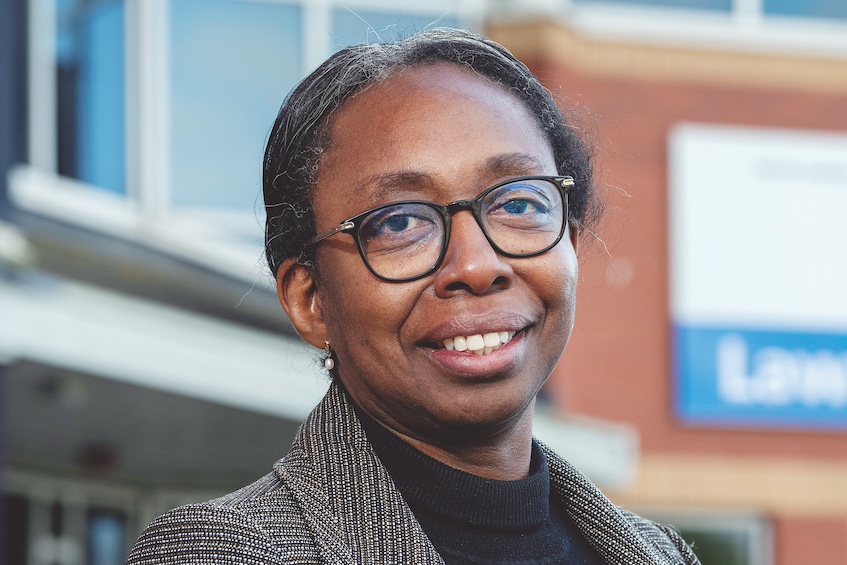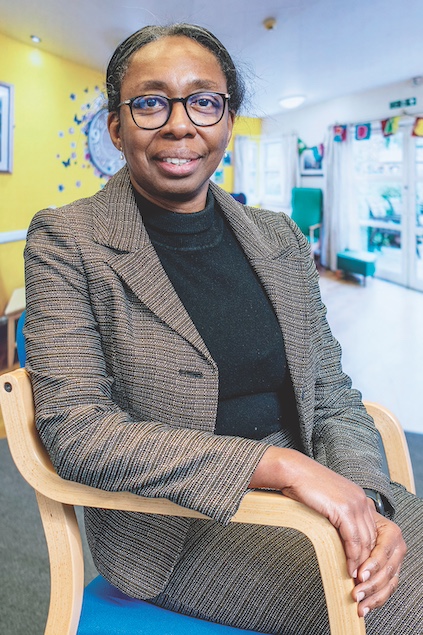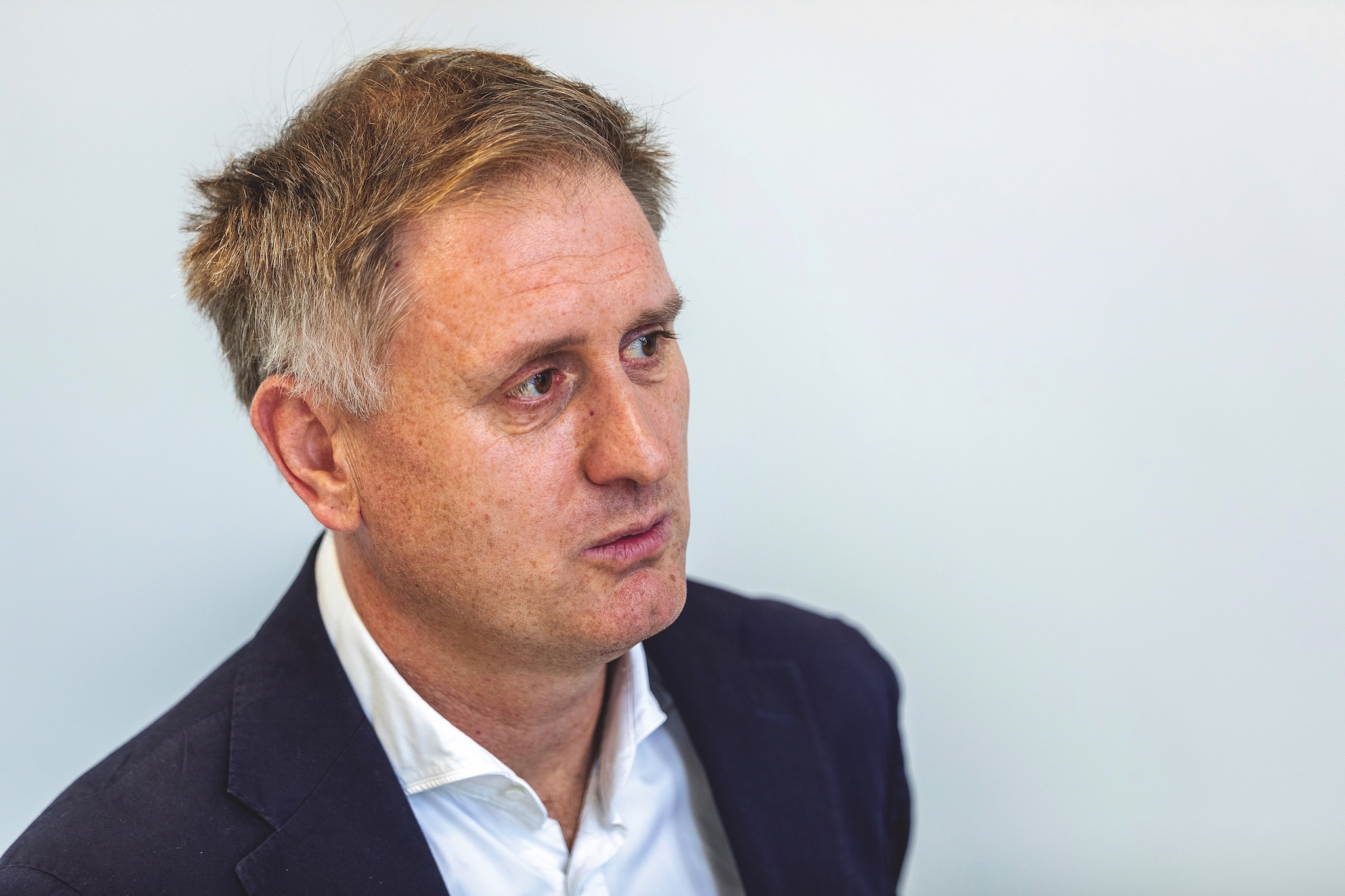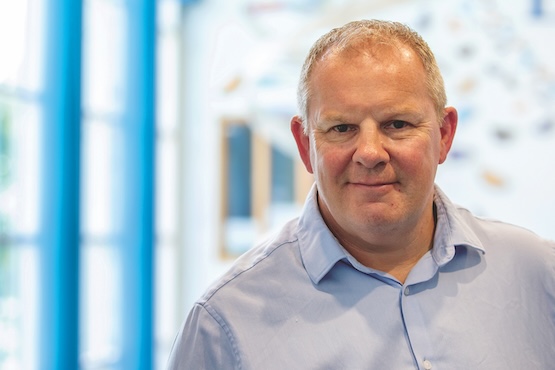“I don’t want people to wait for permission”
North Staffordshire Combined Healthcare has a good claim to be England’s best trust. In conversation with Matt Ross, chief executive Dr Buki Adeyemo explains the ingredients for the trust’s remarkable success against the odds: a stable and happy workforce, a listening leadership, ambitious goals and an enthusiasm for innovation.

North Staffordshire Combined Healthcare NHS Trust has not been dealt an easy hand: it provides mental health, social care, learning disability and substance misuse services in and around the city of Stoke-on-Trent, whose slow post-industrial decline has left it as the 25th most deprived among England’s 316 local authority areas. This makes for a challenging caseload: the city’s rates of infant mortality, homelessness and self-harm emergency admissions, for example, are twice the national average. Yet the trust has a remarkable record on staff morale and engagement.
In 2019, Combined was rated Outstanding by the CQC, which noted that leaders were pursuing the “empowerment of staff at all levels”. In the 2021 NHS Staff Survey, the first to measure performance against the seven NHS People Promises, it achieved the best results among all 217 English trusts – coming first on three promises, and second on two (see mip.social/best). It maintained those scores in 2022, leading its cohort in four of the seven promises, with even better results in key metrics – such as the proportion of staff recommending it as a good place to work – even as national averages fell. And in November 2022, Combined won the HSJ’s Trust of the Year Award.
It’s a measure of the trust’s levels of staff engagement that Dr Buki Adeyemo, chief executive since 2021, has worked there almost continuously since 1998 – when she arrived from Nigeria, attracted by the NHS model of a health service provided free at the point of need. “That remains something that I value dearly,” she says now. Indeed, in the field of mental health the NHS’s offer has “come on in great leaps and bounds”, she adds. “The NHS is more accessible than it was when I first started.”
I’m amazed at how our staff delivered
That accessibility has, however, taken a battering since the pandemic, which saw steep rises in mental health referrals and waiting lists. Growing demand isn’t driven just by a higher incidence of mental health problems. “The raising of awareness and the recognition of the need to maintain mental health brought those increased referrals to our doors”, Adeyemo observes. And while waiting times have lengthened, she is keenly aware that other parts of the NHS have seen a tighter squeeze: mental health was “relatively protected” under the NHS Long Term Plan, she notes.
As these comments show, Adeyemo is a carefully positive individual. But she acknowledges that these last three years have been challenging times – particularly where people and finances are concerned. “I did worry that we’d never be able to fill a number of the vacancies,” she says, but throughout this period, “I’ve been just amazed, blown away by how our staff – regardless of their own personal worries, their circumstances – really delivered.”
That delivery reflects the trust’s high morale. To keep people’s spirits up amid the uncertainty and daily peril of the pandemic, senior leaders focused on ensuring staff had the right tools and felt appreciated. Gestures such as providing refreshments can have an important impact, Adeyemo says: “We can never hope to repay what they did, but there were little tokens of appreciation and lots of wellbeing days.” As inflation began to spiral in early 2021, presenting a new challenge to staff morale, the trust bumped up mileage rates, secured staff discounts and partnered with a debt advice provider.
Above all, leaders showed they were listening to the workforce. Using the ’Dear Buki’ service, for example, staff can leave anonymous messages setting out any concerns they have; both these messages and her responses are (confidentiality permitting) published for all to see, demonstrating that the trust acts to tackle problems – and not to silence whistleblowers. It’s crucial to show that “we’re actually listening – and doing something about what they’ve raised,” Adeyemo explains.
The relationship with staff side trade unions is critical. “I’m proud that we work in partnership with our unions,” says Adeyemo. “Our staff side are wonderful. They come to us and let us know when things aren’t as they should be. Jenny Harvey, our staff side [chair], is on the board and regularly meets with our chief people officer.”
“The sky’s the limit”
To communicate directly with staff, Combined has invested in digital technologies: the trust has its own online TV station and podcast – all produced in-house – and has fitted a room with LED walls, creating a backdrop for broadcasts, hybrid meetings and training. Indeed, Adeyemo is a champion of all things digital: the NHS is “a bit backward” in its use of technology, she believes – but there are huge opportunities in service delivery.
Combined already makes extensive use of virtual reality systems: staff have used VR headsets to experience the symptoms of delirium, for example, while dementia patients can visit facilities virtually before walking into a new space. Some services are easier to deliver online, Adeyemo points out: where children have “school refusal”, for example, providing services remotely means that “you don’t have to drag them out: they can access it in their rooms. And if they don’t want you to see their face, they might be more comfortable using an avatar. The sky’s the limit, in my view, for how we use AI to increase efficiency and improve the quality of delivery.”
Some of these new services have their roots in a ‘Dragon’s Den’-style scheme that gathers ideas from the Combined workforce, explains Adeyemo: she’s a firm believer in innovation, pursued with every available tool. Asked about the constraints on her freedom of manoeuvre as a leader, she replies: “There are ways and means, and I personally don’t subscribe to waiting for permission. I think if we’ve been given a budget, then we as a trust and as leaders need to work to the best of our ability to deliver whatever we can. And I don’t want other people to wait for permission either.”
In this spirit, Combined has partnered with the Keele School of Medicine to provide a physician associate apprenticeship. “I’ve always worked in a multidisciplinary way in my clinical practice. We’ve had a culture where we’ve looked at the skills required rather than saying: ‘We need a doctor, we need a nurse’,” she comments. In promoting such initiatives, the NHS England Workforce Plan, published last summer, makes “a great start” on addressing the NHS’s yawning skills gaps: “We didn’t have anything before that resembled something we could use,” she says.
Vacancies are a major problem
The trust’s high morale helps in recruiting and retaining staff but, says Adeyemo, vacancies are still a major problem, particularly in some medical roles, such as consultant psychiatrists, and in technical and support functions like IT and estates: “That’s where NHS [pay] banding is not helpful, because you’re competing against the private sector,” she warns. While managers ensure that staffing gaps don’t affect patient safety — “we are absolutely clear as a board that we will put in the staffing required to ensure people receive safe, quality care,” she insists — but this comes at the cost of longer waiting times.
The trust tends to focus on developing apprenticeships and university partnerships rather than recruiting overseas, Adeyemo explains. As a relatively small employer, it lacks the scale to provide proper pastoral care to new arrivals, she says, so it’s better to develop UK staff “rather than do a shoddy job” of overseas recruitment. This position reflects her own experience: Adeyemo has spoken before about the difficulties she encountered adjusting after her arrival in the UK 1998, and recently helped to produce an induction guide for overseas recruits to help ease their transition to the NHS.
 Adeyemo: “Leaders have grown up in Combined—as I have—and they’re the ones bringing in new people. That stability gets translated down. There’s a thread of culture that reamins and gets propagated.”
Adeyemo: “Leaders have grown up in Combined—as I have—and they’re the ones bringing in new people. That stability gets translated down. There’s a thread of culture that reamins and gets propagated.”
Once she’d settled in at Combined, however, Adeyemo found herself thoroughly at home – and steadily made her way up, via roles as a psychiatric consultant and medical director, to the top job. Asked why the NHS still has so few ethnic minority trust leaders, she calls for “allyship — people in positions of authority who are prepared to stand up and say: ‘Hang on a minute, this person is great for the job’.” Twice, at key moments in Adeyemo’s own career, white women in senior roles encouraged and championed her, giving her the confidence and support to move forwards.
“There’s also something I say to colleagues of non-white heritage,” she adds. “We’re guilty of not putting our names forward when those positions become vacant. I can understand why: because people have been knocked back so many times that they get fed up.” But if people don’t apply for fear of rejection, the situation cannot improve.
Stable and supportive
Adeyemo’s career path illustrates another factor behind Combined’s strong morale: many of the trust’s senior executives have worked there for decades, supporting long-term thinking and perpetuating the trust’s supportive culture. In this environment, positive behaviours lead to promotion, creating a virtuous circle. “I see this in the medical workforce as well, because medical leaders have grown up in Combined – as I have – and they’re the ones who are bringing in new people,” she says. “That stability then gets translated down. There’s a thread of culture that remains and gets propagated.”
So Combined’s high morale rests on a range of strengths: the stability and cultural reinforcement that comes from developing leaders in-house; an accessible chief executive, acting publicly and positively on signals from the workforce; careful attention to showing staff they are valued; a close partnership with staff side; regular communications through a wide range of channels; and an inventive, forward-looking, mission-focused approach to leadership.
Any more? “We always aim to be outstanding in what we do,” replies Adeyemo. In the past she’s irritated her executive team, she recalls, “when they say: ‘Oh, that’s good.’ And I say: ‘Yeah, but it’s not outstanding.’ But I think they’re used to it now!” The point is to set ambitious goals: “We have to ensure that we’ve done our absolute best for anyone who comes through our doors, whether staff or patients. The outcome needs to be better than good.”
That’s difficult to achieve, given today’s pressures on the NHS: trusts cannot handle ever-growing demand indefinitely, warns Adeyemo. “I worry that we’re so paternalistic that we want to be everything to everyone. But we need to be honest: the NHS budget is not infinite,” she says, calling for “a conversation with the public about what they can do themselves and what they need from the NHS – otherwise we will run it into the ground, and I don’t want to see that. The NHS is a good model, but I would really love to have that conversation.”
Finally, what skills and behaviours does Adeyemo believe the next generation of NHS leaders will need? “You’ve got to enjoy what you’re doing,” she replies. “It’s important to have a life outside work, and look after yourself.” Above all, though, “managers need to have compassion. That means putting yourself in other people’s shoes, whether it be the healthcare support worker, our domestic staff, or another executive: we need to be able to experience what others are experiencing.”
“If you have that ability to look after those around you, I think you’ll get results. That’s reinforcing, and the cycle goes on,” she adds. “So make sure you have oodles of compassion for people.”
Related News
-

“Showing kindness and trust creates a virtuous circle – people respond well to that”
As chief executive of Suffolk and North East Essex, one of England’s most highly rated integrated care boards, Ed Garratt has pioneered a radically different approach to leadership – one based around kindness, trust and putting down deep roots in local communities. He talks to Healthcare Manager’s Matt Ross.
-

We need to give managers reasons to join the profession — not risks to avoid
Steve McManus’s work developing the leaders and managers the NHS needs for the 21st century has caught the eye of national leaders. The Royal Berkshire trust chief executive talks to Matt Ross about transforming services, developing leaders and the right way to regulate the management profession.
-

Interview: Dr Phil Hammond, doctor, comedian, health campaigner
Doctor, comedian, broadcaster, writer, health campaigner and politician manqué, Dr Phil Hammond is now drawing up a manifesto to rescue the NHS and boost the nation’s health. On the eve of a watershed general election for the UK, he spoke to Healthcare Manager’s Matt Ross.